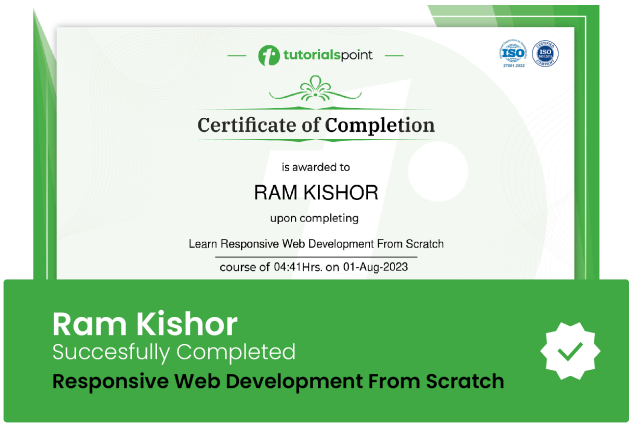Make Your Operating System Fundamentals Rock Solid - Ultimate Course
Operating System Fundamentals: Mastering Core Concepts with 100+ Top Notch Examples
Lectures -23
Duration -5.5 hours

30-days Money-Back Guarantee
Get your team access to 10000+ top Tutorials Point courses anytime, anywhere.
Course Description
This course represents the epitome of comprehensive learning available on this platform, a claim I can confidently stand by. Every effort has been dedicated to delving into the minutiae of the subject matter. Leveraging Numerical and Practice Sessions, I've endeavored to fortify your understanding of OS concepts and foundational principles. The breadth of topics covered is extensive, and even if you possess a rudimentary understanding of OS, you'll undoubtedly appreciate the depth this course explores:
Curriculum :
1. Introduction and Background:
a. Defining an OS:
Elucidated through 5 Definitions
Von Neumann Architecture
Stored Program Concept
Significance of Main Memory
OS as Interface
OS Kernel
OS as Resource Manager
OS as Control Program
b. Types of OS:
Uni-programming and Multiprogramming
Degree of Multiprogramming
Addressing CPU Idleness
Throughput
Schematic View of Multiprogramming
Types of Multiprogramming OS
Comparison between Multiprogramming and Multitasking OS
Architectural Requirements for Implementing Multitasking OS
Kernel & User Mode
c. User and Kernel Mode Shifting:
APIs
Fork system call
Interrupt
ISR
PSW
Types of Functions
Perspective on Mode Shifting
2. Process Management:
a. Understanding Processes:
Distinguishing between program and process
Key C Concepts
7 Definitions of Process
Treating Process as an ADT (Abstract Data Type)
Various Process Operations
Process Attributes and PCB
b. Process Transition Diagram:
Different Process States
Process State Transition Diagram
Introduction to Schedulers and Dispatchers
Addressing Common Doubts
c .Scheduling Queues and State Queuing Diagrams:
Detailed Examination of Schedulers and Dispatchers
Context Switching
3. CPU Scheduling:
a. Introduction and Process Times:
Implementation of Short-Term Schedulers
Functions and Objectives
Understanding Process Times (AT, BT, TAT, IOBT, CT, Schedule Length)
b. FCFS:
Selection Criteria
Operational Mode
Conflict Resolution
Assumptions
Challenges with FCFS Scheduling
Gantt Chart
% CPU Idleness and Efficiency
c. FCFS with Dispatch Latency and IOBT:
Addressing the Most Complex FCFS Problems
Goals
What will you learn in this course:
Upon completing this comprehensive course on operating systems (OS), learners can expect to achieve the following outcomes:
Comprehensive Understanding: Gain a profound understanding of operating systems, encompassing various aspects such as definitions, architectures, types, and functionalities.
Conceptual Clarity: Develop clarity on fundamental concepts including process management, CPU scheduling, user/kernel mode shifting, deadlock handling, memory management, and more.
Practical Application: Acquire practical skills through numerical exercises and practice sessions, reinforcing theoretical knowledge with hands-on experience in implementing OS concepts.
Enhanced Problem-Solving Skills: Learn to analyze and solve complex OS-related problems, including process transitions, scheduling conflicts, memory allocation, deadlock detection, and system resource management.
Proficiency in Implementation: Master the implementation of short-term schedulers, memory allocation algorithms, deadlock prevention and detection mechanisms, and other critical OS functionalities, facilitating efficient system operation and resource utilization.
Critical Thinking Abilities: Develop critical thinking skills by addressing common doubts, exploring advanced topics such as deadlock avoidance strategies, and evaluating the trade-offs involved in memory management techniques.
Increased Efficiency and Performance: Understand the nuances of CPU scheduling algorithms, memory management strategies, and deadlock handling mechanisms, leading to improved system performance, reduced resource contention, and enhanced overall efficiency.
Appreciation of Depth and Complexity: Gain an appreciation for the depth and complexity of OS concepts, covering a wide range of topics with meticulous attention to detail, including but not limited to deadlock handling, virtual memory management, file systems, and device management.
Preparation for Real-World Challenges: Develop the knowledge and skills necessary to tackle real-world challenges in OS design, implementation, optimization, and troubleshooting, preparing learners for careers in computer science, software engineering, and related fields.
Overall, completing this comprehensive OS course equips learners with a solid foundation and practical expertise in operating systems, empowering them to succeed in diverse roles and industries where OS knowledge is essential.
Prerequisites
What are the prerequisites for this course?
Little bit of C and COA concepts.

Curriculum
Check out the detailed breakdown of what’s inside the course
Introduction and Background
3 Lectures
-
What actually is OS, Its functions and goals. 17:55 17:55
-
Multiprogramming OS , Schematic View of Multiprogramming OS & Modes in OS 33:27 33:27
-
Mode Shifting , Interrupt & System Calls 20:25 20:25
Process Management
4 Lectures

CPU Scheduling
16 Lectures

Instructor Details

Kshitij Sharma
eCourse Certificate
Use your certificate to make a career change or to advance in your current career.

Our students work
with the Best


































Related Video Courses
View MoreAnnual Membership
Become a valued member of Tutorials Point and enjoy unlimited access to our vast library of top-rated Video Courses
Subscribe now
Online Certifications
Master prominent technologies at full length and become a valued certified professional.
Explore Now


 Updated on Apr, 2024
Updated on Apr, 2024
 Language - English
Language - English
